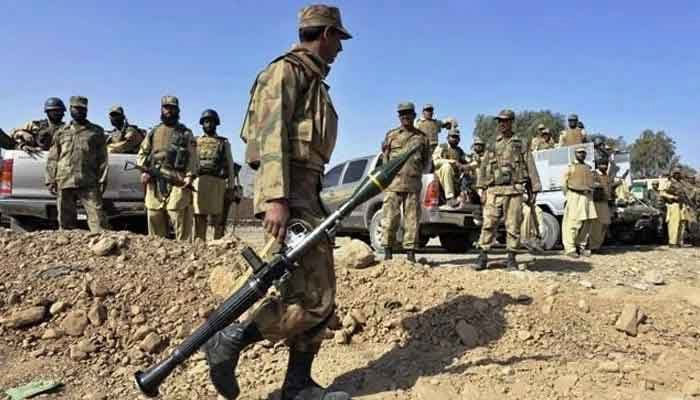Countering terror
IBO was carried out on the terrorists' presence in Takwara area on night between April 6 and 7
Last week brought some welcome signs of progress in the country’s fight against terrorism. Eight terrorists were killed as security forces successfully thwarted their bid to infiltrate through the Pakistan-Afghanistan border in North Waziristan. This was followed by another success, with the security forces killing nine terrorists including a high-value target (HVT) ring leader in an intelligence-based operation (IBO) in Dera Ismail Khan. The IBO was carried out on the terrorists' presence in the Takwara area on the night between April 6 and 7. The North Waziristan operation, in particular, highlights the ongoing challenge of terrorists using Afghanistan as a safe haven to launch attacks against Pakistan and underscores the importance of engaging the Afghan Taliban government to prevent the use of their soil in this manner and counteract cross-border infiltration into Pakistan by militants. While the government remains engaged in this respect and it is heartening to see at least this attempt at infiltration being thwarted, it will take a concrete and sincere effort from the Afghan Taliban on their end to secure the 2500-kilometre-long porous western border.
A report submitted to the United Nations Security Council (UNSC) by the Analytical Support and Sanctions Monitoring Team earlier this year revealed a nexus between Kabul and the TTP with the former providing logistical, operational and financial support to the latter. The report’s conclusions go a long way towards explaining why the Afghan Taliban have seemed reluctant to uphold their end of border security and commitment to counter terrorism. And while it is important to acknowledge the recent successes of the security forces, one must point out that militant violence is on an upward trajectory. According to data released by the Pakistan Institute for Conflict and Security Studies (PICSS), the number of militant attacks in March surpassed the 100 mark for the first time since November 2014, resulting in 228 fatalities, including 73 security personnel, 67 civilians and 88 militants. The intensity of security forces’ response also went up, leading to the deaths of 83 militants, while around 13 security personnel were martyred in the line of duty.
The vast majority of these terror attacks and deaths remain concentrated in the provinces that adjoin the western border: Balochistan and Khyber Pakhtunkhwa. With both expert analysis and anecdotal evidence pointing in the same direction, it is clear that any permanent resolution to the terror problem will require Afghan cooperation. To that extent, a long-term solution to the terror problem will require more than just security operations from the Pakistan side. There is a need to get those in charge across the western border to take counterterrorism as seriously as it is taken here. However, beyond their proximity to Afghanistan, Khyber Pakhtunkhwa and Balochistan are also notable for having some of the most deprived and marginalised areas of the country. The socioeconomic uplift of these regions will also go a long way towards fighting the allure of terror for alienated young people. Kinetic operations alone have been tried in the past and have taken us as far as they will. Diplomatic efforts and a more inclusive economic and political setup are needed to take the country forward.
-
 Andrew, Sarah Ferguson Refuse King Charles Request: 'Raising Eyebrows Inside Palace'
Andrew, Sarah Ferguson Refuse King Charles Request: 'Raising Eyebrows Inside Palace' -
 Adam Sandler Reveals How Tom Cruise Introduced Him To Paul Thomas Anderson
Adam Sandler Reveals How Tom Cruise Introduced Him To Paul Thomas Anderson -
 Washington Post CEO William Lewis Resigns After Sweeping Layoffs
Washington Post CEO William Lewis Resigns After Sweeping Layoffs -
 North Korea To Hold 9th Workers’ Party Congress In Late February
North Korea To Hold 9th Workers’ Party Congress In Late February -
 All You Need To Know Guide To Rosacea
All You Need To Know Guide To Rosacea -
 Princess Diana's Brother 'handed Over' Althorp House To Marion And Her Family
Princess Diana's Brother 'handed Over' Althorp House To Marion And Her Family -
 Trump Mobile T1 Phone Resurfaces With New Specs, Higher Price
Trump Mobile T1 Phone Resurfaces With New Specs, Higher Price -
 Factory Explosion In North China Leaves Eight Dead
Factory Explosion In North China Leaves Eight Dead -
 Blac Chyna Opens Up About Her Kids: ‘Disturb Their Inner Child'
Blac Chyna Opens Up About Her Kids: ‘Disturb Their Inner Child' -
 Winter Olympics 2026: Milan Protestors Rally Against The Games As Environmentally, Economically ‘unsustainable’
Winter Olympics 2026: Milan Protestors Rally Against The Games As Environmentally, Economically ‘unsustainable’ -
 How Long Is The Super Bowl? Average Game Time And Halftime Show Explained
How Long Is The Super Bowl? Average Game Time And Halftime Show Explained -
 Natasha Bure Makes Stunning Confession About Her Marriage To Bradley Steven Perry
Natasha Bure Makes Stunning Confession About Her Marriage To Bradley Steven Perry -
 ChatGPT Caricature Prompts Are Going Viral. Here’s List You Must Try
ChatGPT Caricature Prompts Are Going Viral. Here’s List You Must Try -
 James Pearce Jr. Arrested In Florida After Alleged Domestic Dispute, Falcons Respond
James Pearce Jr. Arrested In Florida After Alleged Domestic Dispute, Falcons Respond -
 Cavaliers Vs Kings: James Harden Shines Late In Cleveland Debut Win
Cavaliers Vs Kings: James Harden Shines Late In Cleveland Debut Win -
 2026 Winter Olympics Snowboarding: Su Yiming Wins Bronze And Completes Medal Set
2026 Winter Olympics Snowboarding: Su Yiming Wins Bronze And Completes Medal Set




